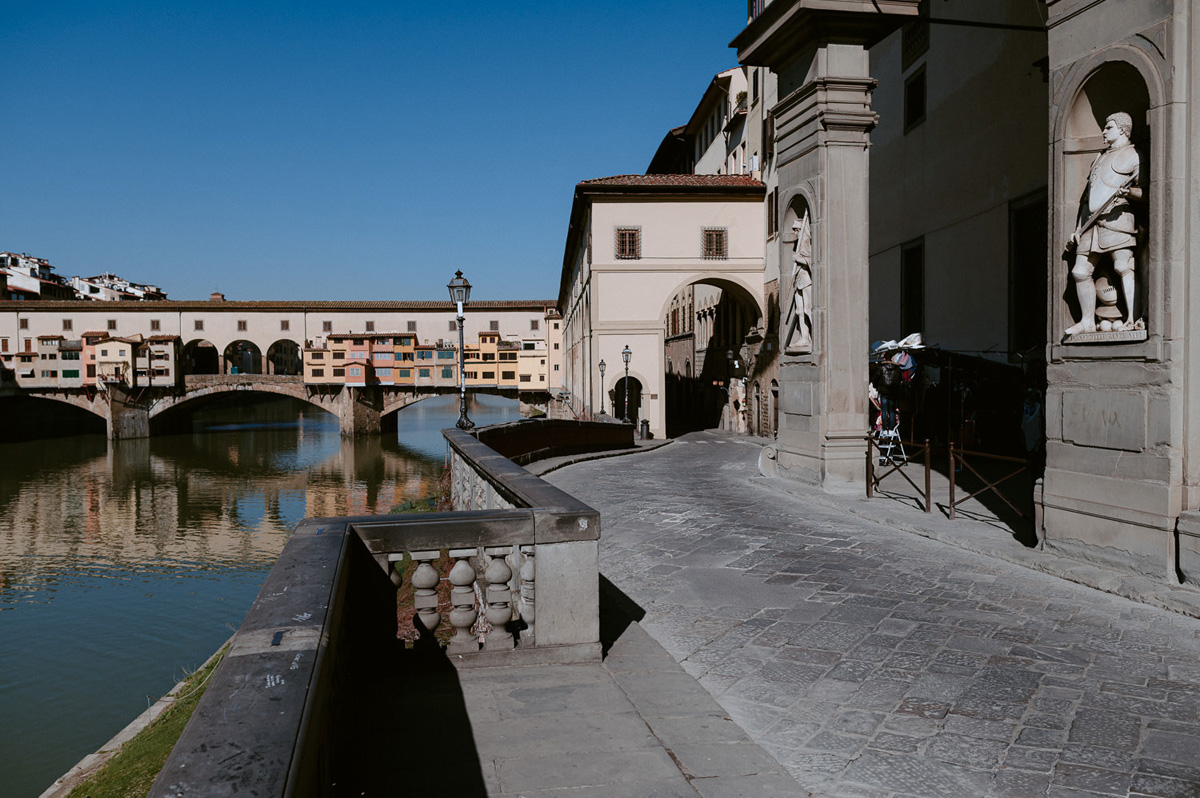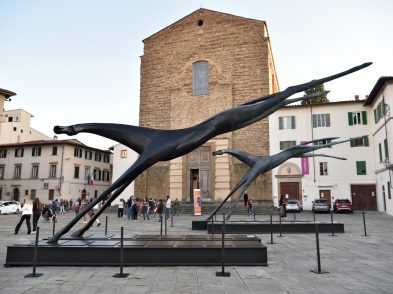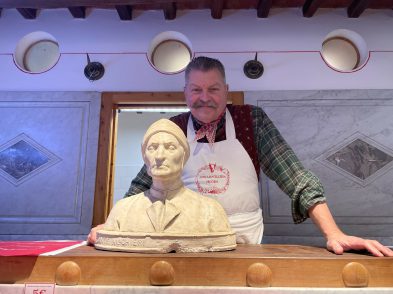It takes me a while to realise I miss the car horns. Traffic still flies by, the emptier roads mean Italians take pleasure in speeding along, but what’s missing is the conversational trumpeting of beeps and long-stretching blows. The rhythm of my mornings is changing; I’m no longer woken by the congested chatter of thick traffic headed out to start the day. Instead, birdsong fills my window, a clearer symphony across the softened soundscape.
I have to cross town to collect my final paycheck, one last task to close my work with the study abroad programs that have now been evacuated. So many of us are now out of work. I walk fast with my hands deep in my pockets, aware not to touch anything and to keep my distance from anyone I see. There are more people than I am expecting, not many, but enough to notice. They walk in singles but there is also the occasional couple. I watch a man and woman kiss, lingeringly, along the edge of the Arno. It seems a radical action, this public expression of touch and intimacy.
A tourist couple, looking very lost, walk briskly by. “Maybe we should get a travel agent from here, from this end, to help us get home.” The city is now for construction workers, couriers and other delivery people. “Where do I park my truck?” one calls from his window. “Wherever you want. You can park anywhere.”
Passing the strip of designer stores I see attendants waiting inside with masks and gloves. Waiting for who, I wonder. An Italian woman paces back and forth in front of a store. “Boh. Comunque. Io rientro a casa.” In the time of lockdown, there are very few valid reasons to leave the house. But Florence has always been a magnificent city of dogs, and now these local heroes are the ticket out. The dogs are walking their owners. I arrive at the office where I collect my pay, and my colleague makes an enthusiastic fuss over his dog, who is jumping and excited. “I brought him just in case. I know I had to come in for work, but still, he’s my extra reason for when I’m heading back.”
I set a brisk pace home. Having finished my task, I feel a strong responsibility to restare a casa, to do my part in the Italian solidarity. On street level, the stores are almost completely closed. A few restaurants stay open, empty, or with one person nursing a beer and pizza alone, or with the staff sitting outside to take the sun, nothing to do, at safe distance from each other. The bottles of hand sanitiser still wait in the pizzeria doorway, from an earlier phase of the restrictions. Now there is almost nobody around to use it. By tomorrow, a new ordinance will be declared, closing down everything but the most essential stores. Police will monitor the streets more carefully and encourage people to go back home if they don’t have a valid reason to be out.
And yet, there are still the sounds of life. They are coming from above. Music from a window drifts through the quiet streets, and the sound of voices filters out through the shutters. A woman walks alone down the street, Palazzo Pitti looming up behind her. The square empty but for a couple of sunbathers, laying close and risking trouble, but there’s no one around to catch them. Voices shout from a high window and the girl on the street laughs. She stops and calls up to her two male friends. A reverse Romeo with two Juliets.
Florence will take to her upper floors and to her windows. There has always been another secret life in this city. The one that exists above ground level. There are those who know Florence from her rooftops and from her windows. While the Vasari Corridor allowed the rulers passage, it is not the only place where life unfolds in the air. People call to each other across streets, window to window, rooftop to rooftop. They lay on balconies to take the sun, and speak to each other through shutters, over railings, calling down, calling up, calling in every direction to reach each other.
Almost home, in my local piazza a small handful of people are spread at great distance from each other, sitting quietly or laying in the sun. I pause on an empty and isolated bench, it seems ok to take a last moment. We are allowed to leave the house for a walk, for some exercise, but we are unsure if this solitary pausing is allowed. An artist calls across the distance, would I mind if he drew a quick sketch of me? I nod permission. It is the kind of exchange that Florence is known for. There will be no more chances after today. When the sketch is done, we pass slips of paper with contact details to avoid drawing too near and touching each other. “When it’s over,” we promise, “we should take a coffee.”

ph/ Francesco Spighi
I nod my head to this last moment of shared time – I have no dog, no more work, and no reason to go out again until it’s time to buy more food. This quiet journey home is a last goodbye to the life we share in the streets. Just for a little while.
But that doesn’t mean we won’t share life. Already at home, people are finding ways to reach out. A brother and a friend send money to help me pay the rent. Later, a friend will tell me how her family are struggling, now in sudden debt. We will share the money. She has helped me before. What one has, one shares.
In WhatsApp groups, friends are translating the latest rules to help everyone understand the changes. We watch the video of Conte outlining the new measures. Just before I go to bed, plans are made for an online aperitivo later in the week. All I have is a dusty old bottle of Baileys. A friend sends a recipe for espresso martini, but I don’t have all the ingredients. The next day, a care package is left at my door. A thermos full of vodka, the missing ingredient, and three books: Love in the Time of Cholera; Guns, Germs, and Steel, and Eleanor Oliphant is Completely Fine. I send laughter in thanks. Another package arrives: health essentials, plus vinegar, wine, and ice cream. “I know you’re doing it tough. Please don’t pay me. Just enjoy.” Tears fill my eyes.
Online networks are quickly being converted into social and mental health support hubs. People trade tips, helping each other to translate the new regulations so that the rules are clear, offering shopping and medicine collection help to anyone living in their area. We send suggestions for things that can help keep children occupied, and fill the time. People write thoughtful articles and messages, with important information to share. Psychologists are posting in groups, offering free short consultations for people struggling with anxiety.
A friend and collaborator makes plans to launch our open mic night online, providing entertainment and a place to share our creativity while we’re in lockdown. This isn’t just about fun, but a serious mental health support strategy. High stress environments, like a police monitored lockdown during a pandemic, are a huge challenge for mental health. Finding alternative ways of creating social support systems is vital.
This is the time that we look around and see what we can offer to those who may be struggling. I publish a letter of love from Italy to my friends around the world. As Ela Vasilescu so poignantly said, “You are us two weeks ago”. While in social isolation, we will continue to work creatively so that no one is alone. There are many who will need help. We know what we have to do. It is a time to come together, to confront the challenges as one. It is time to think of others more than ourselves. We must learn the lessons from this crisis, and let an outbreak of sickness equally become an outbreak of love. Empty streets are the sign of full hearts. We are in this together.








